B.C. has joined an international alliance whose goal is to see cars powered by fossil fuels phased out entirely by 2050, and replaced with electric, hybrid electric and hydrogen fuel cell vehicles.
B.C. Environment Minister Mary Polak made the announcement Thursday, December 11, from Paris, where she is attending the 2015 climate conference.
While in Paris, the B.C. government signed onto the Zero Emission Vehicle Alliance. The alliance includes only one other Canadian province – Quebec. Both Quebec and B.C. have an abundance of clean hydro power, which is best suited for electric and hydrid electric vehicles.
Eight American states also belong to the alliance, including California. European members include Germany, the Netherlands, Norway and the UK.
EV adoption has been slow in coming in B.C., despite incentives to help drivers make the switch to ZEVs.
B.C. implemented an incentive program in 2011 that provided a rebate of $5,000 to $6,000 to buyers wanting to buy EVs, hybrids or fuel cell cars and to install recharging stations. There is also a rebate that allows car owners to get $3,000 for turning in a vehicle that made in 2000 or earlier, if they plan to buy a new EV.
Sincephase two of the program was announced in March, the number of EVs sold in B.c. has doubled, from 915 to about 2,000, and there are currently 1,000 charging stations in B.C.
But that is still far short of what’s needed to provide the critical mass and convenience that would-be EV owners want, said B.C. Energy and Mines Minister Bill Bennett.
“We’ve got the largest charging infrastructure in Canada, and it is woefully inadequate,” Bennett said, adding that he thinks increasing charging infrastructure should be one of the top priorities for B.C. climate action plan, which is currently being updated.
“That’s really going to have to be a focus, and through our Climate Action 2.0, we’re going to have that discussion internally, and for me, that should be a priority.”
The biggest problem in wider adoption of ZEVs may be the auto dealers and automakers. As Business in Vancouver columnist Peter Ladner pointed out recently, even those automobile manufacturers who are now making ZEVs have not done much to market ZEVs, and there have been complaints that would-be ZEV owners can’t even find these vehicles in car dealer showrooms.
While the upfront costs of a ZEV are higher, the payoff is that the fuel – electricity – is cheap and EVs require little ongoing maintenance.
Car dealers could lose a considerable amount of business in maintenance, since electric cars don’t require regular oil changes, or other routine maintenance that internal combustion engines require.
California has addressed the problem by implementing a ZEV program that requires at least 10% of new car sales to be ZEVs. Asked if he thinks B.C. should adopt a similar policy, Bennett said: “I don’t know if we’ll go down that path alone. California has a huge marketplace and you can justify things in California that you probably can’t justify in B.C.
“I think overall we have to have the rest of the country in on this zero emissions vehicle goal. It’s not achievable without the provinces being onside and the federal government being onside.”




